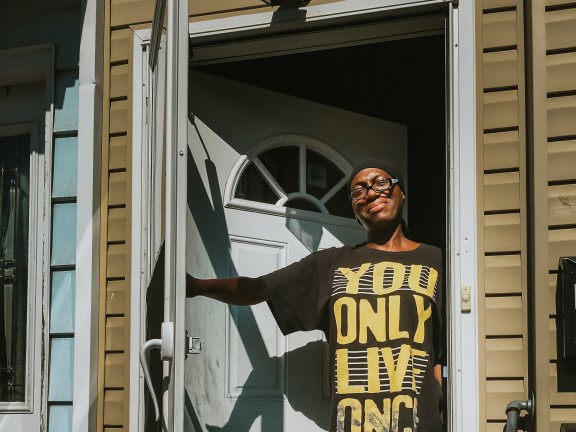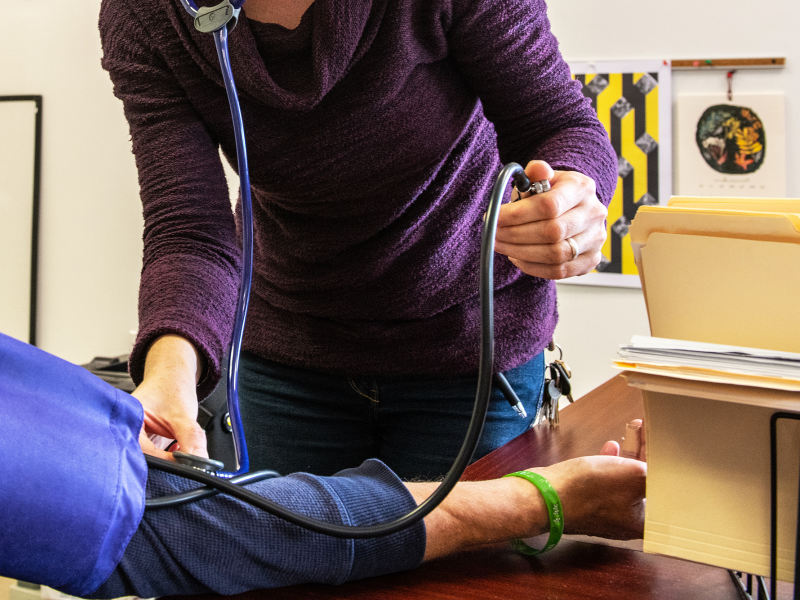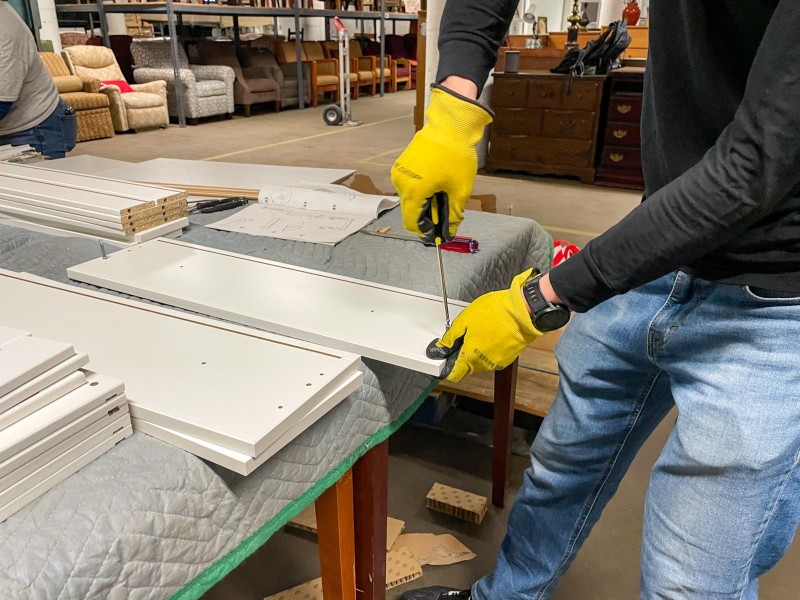Meet Candy

I first met Candy in January 2015, when I working as a therapist at an inpatient residential drug and alcohol program. It was her second time in treatment there, with three more admissions to come in her future. Candy was active and engaged in the program. She participated in daily therapeutic groups, cooked meals for the house, and spent her free time reading the Bible or socializing with family members. She was clearly able to describe her goals and a vision for her life in recovery, including attendance at mutual aid support groups upon discharge. However, Candy had no stable home to return to. At that time, the program was not connected to any supportive housing resources. Our members would spend anywhere from 3-9 months in treatment only to return to the streets, shelters, unsupportive family members, friends’ couches, or motel rooms from whence they came.
After experiencing years of homelessness and many intermittent courses of dual-diagnosis treatment and shelter stays, Candy was referred to Pathways in February 2020. Within two weeks of first meeting with the team, she moved into a one bedroom apartment in the Frankford neighborhood. I met with her in her apartment a few weeks ago to catch up and to learn about her life since getting connected to our Housing First program.
Q: What was life like for you before you came to Pathways?
Before I came to Pathways, life was up and down for me. It was hard for me to deal with the different shelter programs. I felt unease in the shelters. I had a lack of trust with the people. So, as that went on, I stayed in the street. I lived in the street for almost two years.
Being a trans woman, I thank God I didn’t get caught up deep into prostitution, but I was panhandling. I was on drugs at the time, so I did whatever I had to do just to get that next one. I drank, because it comes along with all that. I had to deal with other people’s situations. I had to deal with getting stuff stolen from me and my clothes being stolen. Then I got hit in the head out there and I had to go to the hospital.
All these types of things were happening to me when I was in the street, but I kept going to outreach. So every time I would see them I would give them my name. Winter time was the rough time because it was cold. I slept underneath the subway in the wintertime. Outreach would come down there and – by the grace of God – every time I would see them, I put my name down.
Q: Can you tell me about how you got connected to Pathways?
Everybody has their own way of dealing with issues. Other people I knew out in the streets— they’d get locked up in the winter to go get some rest, come back out in the summer, and keep doing what they were doing. Outreach people would try to help them and they wouldn’t even give their names. Me, I decided I wanted to do something different. I got tired of living out there.
I had a case manager, Daniel at Philadelphia FIGHT, who said he was going to look around to see what type of programs I could get into so I could get a place. He said it seemed I was better being on my own, because I know how to take care of my responsibilities and pay my rent without any interference. I know how to do those things.
Daniel gave me some coffee and the address, and I went up there and met Jocelyn, the Assistant Team Leader. They took care of me. I felt like I was in a good place and I felt good about that. I stayed at a Safe Haven while they looked for an apartment for me. Then I met Raheema, a Certified Peer Specialist, and she walked me through all the steps and everything. I signed papers and within two weeks, I was here. I saw the psychiatrist, Dr. Hails, and the nurse came to check me out and make sure my blood pressure was good. They’ve been very good. You know, I’m 58 years old. I’m not getting any younger. So I’m just living life right now and growing old gratefully.
Q: What has life been like since you got into this apartment?
First of all, I kept losing my keys. Those keys were a doozy! So the team gave me one I can wear around my neck. I added more keys to the one they gave me, so now I can’t lose it because there’s a whole lot of keys on there. After that, my neighbor and I got into it for a little bit but now we’re the best of friends. She even gave me her microwave when she got a brand new one.
It’s been nice so far. Sometimes the neighbors across the street give me that look. You know, we know that look. But I pay it no mind – I’m older now, I don’t have to feed into it every time someone gives me a look, you know what I mean? I also feel more accepting of my gender. Before, I always hid my gender because I didn’t want others to know who I really was. I kept myself closed in like that. Now, I have a limit and I don’t care. As long as I’m doing the right thing, I just keep it moving and take care of my business and come back home.
I can’t allow myself to keep going backwards. So I’m trying to adjust the best way I can, which I think I’m doing a good job for myself. I’m still in contact with my therapist. I still have phone calls every Thursday. I talk with my recovery staff a lot, and I talk the deep stuff to her. I let her know where I’m at and what I have been doing. Have I taken a drink since I’ve been here? Yes, I have, but I have not gone overboard with it. I know that would lead me out the door, and it would make me other than myself, and I’m tired of being other than myself. It’s time for Candy to grow up and be who Candy is. So now I allow my support system to check up on me, and that makes me feel good.
Q: How have you been spending your free time?
I have a little family around here. I speak to them. I see them, though I don’t let them come to the house. Every time they come, they want money and I don’t have it like that. I’ve got to pay rent and get this place together. It costs you to stay in a house! This is where your real test comes from. I don’t have any outside company coming here – only my boyfriend – the rest, no.
My mom and sister passed away, but me and my niece are still together. She’s still my payee. She comes to check up on me and take me food shopping. We talk on the phone and I tell her how I’m doing. She’ll ask me if I’m drinking and I’m honest with her. I’m waiting for the church around the corner to open up again. There’s not too much you can do right now because everything is closed.
Other than that—you can see—I stay busy cleaning. I go outside and cook on the grill. My neighbor and I take turns cooking together. I might cook one day and she cooks the next day. She had some help around the house, because she’s up there in age, but that person went in the hospital so I told her, “I got you.” I help her with getting things from the store and things like that.
Q: How do you think having a place of your own has helped with your recovery?
I think it helped a lot with that. I have to pay my bills on time. When you’re living in a place like this, you have to make sure that you’re keeping it a certain way. You can’t just have anybody and everybody running in and out. You have to put some rules and regulations down. The one thing we know about drinking—the next day you don’t feel like doing nothing. And I know if I drink too much, it’s gonna lead to something else and I’m gonna get lost back out there again. So it’s on me to either keep what I got or just give it away. Today, I prefer to keep what I have. I don’t have nothing else but this, my niece, and y’all to make sure that I’m okay.
I look at myself now and think, “You know what, Candy? Do something like an adult would do. You played enough games out there. Get honest now so you can grow.” That’s what I’m taking the time to do now. That’s what’s helping me not drink as much and to do the things I need to do. Other drugs—no. I don’t want no more of that. My body can’t deal with that no more. I got sick and tired of being sick and tired. People can say that, but when your body starts showing you and you start getting an achy back and you can’t get up out the bed half the time—No, you gotta stop.
So that’s where I am. I’m taking care of me. I’m taking my medicine regularly now, and my hormone shots. I’m not overdoing it. I take my blood pressure medication. I’m getting ready to start back on treatment for my Hepatitis C now that I am in a very good spot and I have a stable place. I was trying my best before, but look at me now! I am so happy.
Q: What goals have you been working on? What’s next for you?
I pay my bills. I keep things clean. I take care of my plants. I go food shopping,and cook, and take care of myself better. I have friends I can call on the phone who have their own apartments and are doing good. I’m just working on myself, like not doing certain drugs. In the future, I want to work towards getting my license and I’m gonna save up for a little red Dodge. I also want to go back to get my GED. Then when they open the city up again, I’m gonna start making my meetings again. I’m just taking baby steps.
Philadelphia Fight worked with the Department of Behavioral Health and DisAbility Services (DBH) to connect Candy to Pathways. Pathways does not accept outside referrals; all of our clients are referred through DBH. Those experiencing homelessness are encouraged to call Street Outreach at 215-232-1984 to be connected to a program that fits their needs.


